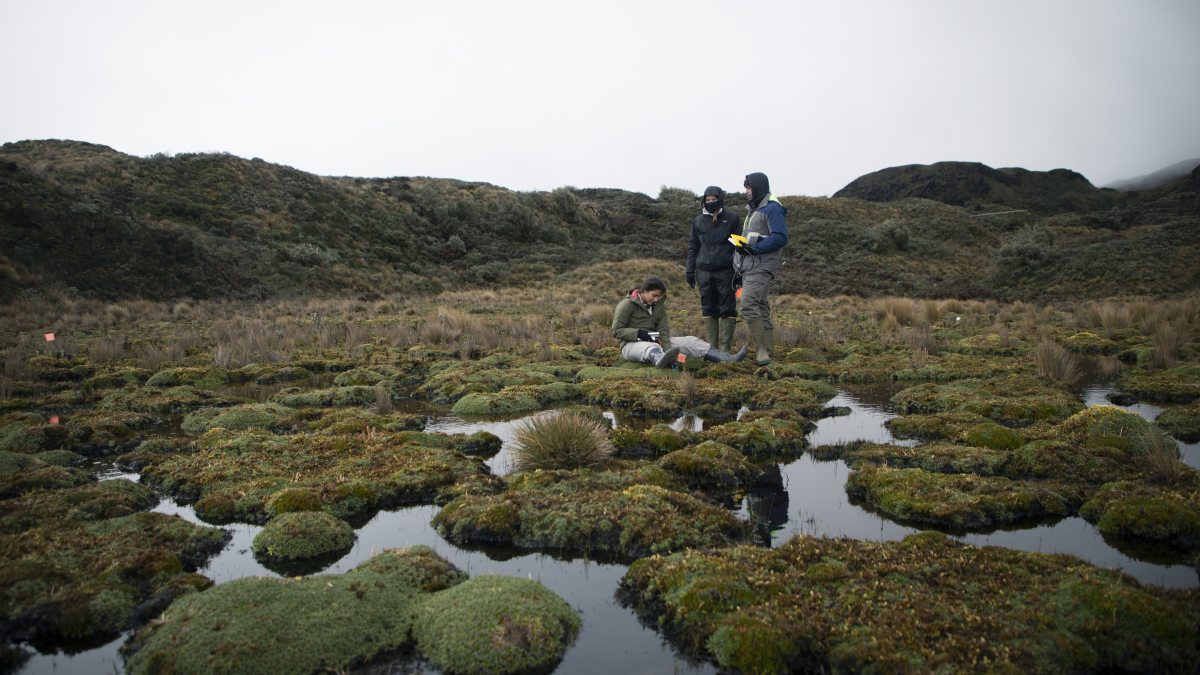Carolina wins grant for undergraduate climate change research in Ecuador
With the funding, students at UNC-Chapel Hill and Universidad San Francisco de Quito will conduct climate change research over the course of a year. Four Carolina students will travel to Ecuador this summer to conduct field research in the Páramo.

UNC-Chapel Hill has been selected to receive a grant from the 100,000 Strong in the Americas Fund as part of the 2022 U.S.-Andean Innovation Fund Grant Competition co-sponsored by the U.S. State Department’s Bureau of Western Hemisphere Affairs. With this funding, students at UNC-Chapel Hill and Universidad San Francisco de Quito will conduct climate change research over the course of a year.
Diego Riveros-Iregui, Bowman and Gordon Gray Distinguished Professor of Geography, will be the principal investigator for the grant. He will take four UNC-Chapel Hill students to Ecuador this summer to conduct field research with USFQ students and researchers in the Páramo. Found only in the Andes Mountains, this cold yet tropical landscape provides drinking water to millions of people in South America and serves as one of the most carbon-rich locations in the world.
In the fall, UNC-Chapel Hill and USFQ students will analyze their collected data in a Collaborative Online International Learning Plus course. COIL is a pedagogical approach involving shared teaching and learning between faculty and students in two or more countries. When faculty add a travel component to the class, it becomes a COIL Plus course. To date, UNC-Chapel Hill and USFQ faculty have offered nine partnered COIL courses.
Riveros-Iregui will co-teach the course with Esteban Suárez, director of the Biosphere Institute at USFQ and academic content coordinator for the grant. Riveros-Iregui notes that data analysis is one of the hardest parts of conducting research, but COIL will make it easier.
“The idea is that students can transition from the field to the classroom easily and naturally, so they can continue collaborating on the next phase of the project,” said Riveros-Iregui. “The students will go from working together in the field to working and thinking together through Zoom. My goal is that, by the end, students realize that this is how long-term research collaborations take place, and that through the process, they have also built relationships that will last a lifetime.”
In spring 2024, the grant will fund the opportunity for USFQ students to visit Chapel Hill and present their research with their Carolina collaborators at the University’s annual Celebration of Undergraduate Research symposium.
Expanding Global Opportunities
This program builds upon “International Research Experience for Undergraduates in Water–Ecosystem Interactions,” a project Riveros-Iregui has led since 2019.
IREU supports Carolina students who are traditionally underrepresented in science, which aligns with the goals of the 2022 U.S.-Andean Innovation Fund Grant Competition. The fund supports partnerships between higher education institutions in the United States, Colombia, Peru, Ecuador and Bolivia that create access to inclusive training and exchange programs for underserved students and faculty.
As a first-generation college graduate, Riveros-Iregui understands the importance of opportunities and mentorship for underrepresented students.
“I’ve been very fortunate to have a lot of mentors in my career, and I’ve learned from many people,” said Riveros-Iregui. “I simply want to provide this opportunity to other students so that they feel empowered – so that they feel science is something they can do for their professional lives.”
Riveros-Iregui explained that the research collaborations have been largely one-sided in the past, with Carolina students traveling to Ecuador to conduct research. The 100K Strong funding will support mobility for both UNC-Chapel Hill and USFQ students.
“Students there, they are just like students here,” said Riveros-Iregui. “They have the same dreams and the same desires to go see and explore the world, but they face the challenges of costs, so this project seeks to close that gap.”
Foundations of a Strong Partnership
IREU is one of many collaborations between UNC-Chapel Hill and USFQ. The two universities have held a strategic partnership for more than a decade.
“Our strategic partner in Ecuador, well, they’re excellent,” said Riveros-Iregui. “They have very high standards for research and education. With my colleague, Esteban Suárez, we are equally interested in seeing this project succeed, and that is something very valuable in a partnership – that you have the same goals, and you want to see them come to fruition.”
Riveros-Iregui credits the Office of the Vice Provost for Global Affairs for identifying this opportunity and providing support through the application process.
“Vice Provost for Global Affairs Barbara Stephenson and her entire office are making it possible,” he said. “We would not be able to do this kind of work at the level that it’s going to happen if it wasn’t for that additional lift from her office.”
OVPGA supports the development and growth of mutually beneficial global partnerships.
“One of our objectives is to spot opportunities for faculty members to grow their global research collaboration while strengthening our global partnerships,” said Stephenson. “This grant will further meaningful exchange between UNC and our strategic partner, USFQ, which helps us in our mission to bring Carolina to the world and the world to Carolina.”




